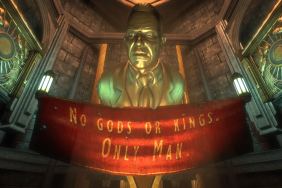Though BioShock Infinite attracted critical acclaim upon its release, many complained about its heavy-handed conclusion to the story of the Vox Populi, the rebel insurgency group who aimed to bring an end to the game’s xenophobic dictatorship.
Throughout the game protagonists Booker DeWitt and Elizabeth side with the Vox Populi, helping them on their mission to overthrow the white supremacist regime dominating Columbia and end the slavery of the racial minorities occupying the floating city. However, upon achieving their goal the Vox Populi are depicted as just as murderous as those who had enslaved them, with them killing plenty of innocent civilians following their uprising. This is exemplified by the Vox’s leader Daisy Fitzroy who, in arguably the most controversial scene in the entire game, is shown holding a gun to a child’s head. Elizabeth eventually kills Daisy in order to prevent her from harming the child, and the game’s treatment of the once-heroic rebel was roundly criticized by those who began to question Infinite‘s morals.

Comstock, the xenophobic leader of Columbia.
With the game suggesting that both the slavers and their captives were as bad as one another, there was plenty of discussion surrounding the handling of Daisy Fitzroy’s story, and one that was brought into question with the BioShock series’ creator Ken Levine during a recent interview with Rolling Stone. In the interview, writer Chris Suellentrop suggested to Levine that Infinite‘s detractors think “that [Levine] created a game in which Donald Trump founded a xenophobic colony in the sky, only to learn that the Mexicans really are rapists.” Levine responded to the criticism with the following:
“Here’s what I’d say. BioShock 1 is about Jews. I’m a Jew. If you think about it, Andrew Ryan, Sander Cohen, Tenenbaum, they’re all Jews. Suchong is Korean. During World War II, Korea was brutally occupied by Japan. He’s a guy who survived.
They’re all survivors of oppression. And they don’t come out of it heroes. Oppression turns them into oppressors. And that’s the cruelest aspect of oppression. If you look at Andrew Ryan and Daisy Fitzroy, they’re not that far apart.
Maybe people wanted me to write about a hero who rose above that. Elizabeth is the character I invented who does sacrifice herself to break the cycle. But I think most people are destroyed by oppression. I could tell a fairy tale about people who are ennobled by it. But in my experience, as a student of history, that’s rare.
If you pretend there are a lot of happy endings for those stories, in some ways it elevates the oppression to something it’s not.”
Although BioShock Infinite‘s DLC Burial at Sea attempted to rewrite Daisy’s story by suggesting she only threatened the child to force Elizabeth to kill her, therefore making Elizabeth capable of being a killer, it seems that Levine stands behind his original vision for her character arc despite the controversy surrounding the game.
Levine’s studio, Irrational Games, closed after the release of BioShock Infinite‘s DLC, with the developer currently working on a brand new as-yet-untitled game. Meanwhile BioShock: The Collection, which features remastered versions of the first two BioShock games and Infinite, is now available to purchase on PS4, Xbox One and PC.






